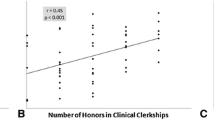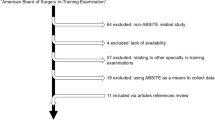Abstract
Purpose
The American Board of Surgery In-Training Exam (ABSITE) is administered yearly in January, and is used by training programs to gauge trainee progress, inform resident readiness for promotion, and signal resident competitiveness for subspecialty fellowships. We sought to explore the impact of vacation status and duty hours on ABSITE performance, hypothesizing that vacation periods in December or January preceding an ABSITE administration would correlate with better performance, and that higher duty hours would correlate with worse performance.
Methods
Retrospective de-identified data were collected from ABSITE administrations between 2010 and 2021, with a total of 300 scores from 83 residents at our institution. Variables collected included logged December and January duty hours and vacation status, rotations, PGY, and individual ABSITE percentage and percentile scores. Analysis was performed using Mann–Whitney U test and a mixed-effects regression model.
Results
We found a significant difference in the distribution of ABSITE percentage scores between residents who worked fewer than 250 h (71.9%) versus more than 300 h (70.5%) (p < 0.05) in December. In the mixed-effects regression model, only a vacation period in December was found to be a significant positive predictor on ABSITE percentage scores (F = 4.21, p < 0.05).
Conclusions
These findings differ from previous studies in that performance differences among residents who had a January vacation prior to ABSITE were not identified. Differences in scores were found between work-hour subgroups for December, and December vacation status was a significant positive predictor of percentage scores. We recommend that duty hours and vacation status during December be considered in the creation of resident schedules and for ABSITE remediation programs.
Similar content being viewed by others
Data availability
The datasets generated during and/or analyzed during the current study are not publicly available due to reasons of privacy but are available from the corresponding author on reasonable request.
References
Decoteau MA, Rivera L, Umali K, Chan AD, Soballe P, Ignacio RC. A multimodal approach improves American Board of Surgery In-Training Examination scores. Am J Surg. 2018;215(2):315–21. https://doi.org/10.1016/j.amjsurg.2017.10.039.
Ray JJ, Sznol JA, Teisch LF, et al. Association between American Board of Surgery In-Training Examination scores and resident performance. JAMA Surg. 2016;151(1):26. https://doi.org/10.1001/jamasurg.2015.3088.
Miller AT, Swain GW, Widmar M, Divino CM. How important are American Board of Surgery In-Training Examination scores when applying for fellowships? J Surg Educ. 2010;67(3):149–51. https://doi.org/10.1016/j.jsurg.2010.02.007.
Shetler PL. Observations on the American Board of Surgery In-Training Examination, board results, and conference attendance. Am J Surg. 1982;144(3):292–4. https://doi.org/10.1016/0002-9610(82)90002-2.
Wade TP, Andrus CH, Kaminski DL. Evaluations of surgery resident performance correlate with success in board examinations. Surgery. 1993;113(6):644–8. https://doi.org/10.5555/uri:pii:003960609390355H.
De Virgilio C, Yaghoubian A, Kaji A, et al. Predicting performance on the American Board of Surgery qualifying and certifying examinations: a multi-institutional study. Arch Surg. 2010;145(9):852–6. https://doi.org/10.1001/archsurg.2010.177.
Taggarshe D, Mittal V. The utility of the ABS In-Training Examination (ABSITE) score forms: percent correct and percentile score in the assessment of surgical residents. J Surg Educ. 2012;69(4):554–8. https://doi.org/10.1016/j.jsurg.2012.04.008.
Minion D, Plymale M, Donnelly M, Endean E. The effect of prior night call status on the American Board of Surgery In-Training Examination scores: eight years of data from a single institution. J Surg Educ. 2007;64(6):416–9. https://doi.org/10.1016/j.jsurg.2007.06.016.
Stone MD, Doyle J, Bosch RJ, Bothe A, Steele G. Effect of resident call status on ABSITE performance. Surgery. 2000;128(3):465–71. https://doi.org/10.1067/msy.2000.108048.
Sugar JG, Chu QD, Cole PA, Li BDL, Kim RH. Effect of January vacations and prior night call status on resident ABSITE performance. J Surg Educ. 2013;70(6):720–4. https://doi.org/10.1016/j.jsurg.2013.06.013.
Smeds MR, Thrush CR, McDaniel FK, et al. Relationships between study habits, burnout, and general surgery resident performance on the American Board of Surgery In-Training Examination. J Surg Res. 2017;217:217–25. https://doi.org/10.1016/j.jss.2017.05.034.
Kim JJ, Kim DY, Kaji AH, et al. Reading habits of general surgery residents and association with American Board of Surgery In-Training Examination performance. JAMA Surg. 2015;150(9):882–9. https://doi.org/10.1001/jamasurg.2015.1698.
Cassidy DJ, Chakraborty S, Panda N, et al. The surgical knowledge “growth curve”: predicting ABSITE scores and identifying “at-risk” residents. J Surg Educ. 2021;78(1):50–9. https://doi.org/10.1016/j.jsurg.2020.06.038.
Godellas CV, Huang R. Factors affecting performance on the American Board of Surgery in-Training Examination. Am J Surg. 2001;181(4):294–6. https://doi.org/10.1016/S0002-9610(01)00576-1.
Kim RH, Tan TW. Interventions that affect resident performance on the American Board of Surgery In-Training Examination: a systematic review. J Surg Educ. 2015;72(3):418–29. https://doi.org/10.1016/j.jsurg.2014.09.012.
Pletch A, Craig W, Rappold J, Whiting J, Turner C. Study strategies for general surgery residents preparing for the American Board of Surgery In-Training Examination: what to keep, discard, and adopt. J Surg Educ. 2021;78(1):43–9. https://doi.org/10.1016/j.jsurg.2020.06.025.
Velez DR, Johnson SW, Sticca RP. How to prepare for the American Board of Surgery In- Training Examination (ABSITE): a systematic review. J Surg Educ. 2022;79(1):216–28. https://doi.org/10.1016/j.jsurg.2021.08.004.
Yeh DD, Hwabejire JO, Imam A, et al. A survey of study habits of general surgery residents. J Surg Educ. 2013;70(1):15–23. https://doi.org/10.1016/j.jsurg.2012.08.006.
Gough BL, Gerges M, Weinberger J. Spaced education with ABSITE quest resulting in improved American Board of Surgery In-Training Examination performance. J Surg Educ. 2021;78(2):597–603. https://doi.org/10.1016/j.jsurg.2020.07.039.
Byrne JM, Loo LK, Giang DW. Duty hour reporting: conflicting values in professionalism. J Grad Med Educ. 2015;7(3):395–400. https://doi.org/10.4300/JGME-D-14-00763.1.
Author information
Authors and Affiliations
Corresponding author
Ethics declarations
Conflict of interest
Nothing to disclose.
Additional information
Each author certifies that this research was given exempt status by the University of New Mexico Institutional Review Board (IRB #21-141) and that all investigations were conducted in accordance with ethical principles of research. This project is supported by an award from the National Center for Advancing Translational Sciences, National Institutes of Health under grant number UL1TR001449.
Rights and permissions
Springer Nature or its licensor (e.g. a society or other partner) holds exclusive rights to this article under a publishing agreement with the author(s) or other rightsholder(s); author self-archiving of the accepted manuscript version of this article is solely governed by the terms of such publishing agreement and applicable law.
About this article
Cite this article
Pang, J.H., Reviere, A., Schwartz, T. et al. Impact of duty hours and vacation status on resident ABSITE performance. Global Surg Educ 2, 4 (2023). https://doi.org/10.1007/s44186-022-00078-1
Received:
Revised:
Accepted:
Published:
DOI: https://doi.org/10.1007/s44186-022-00078-1




